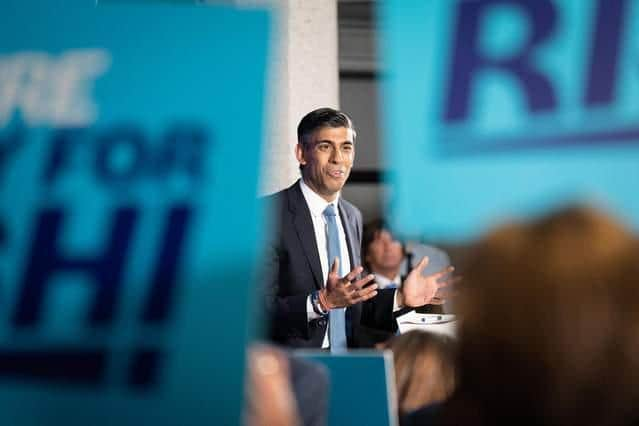Which Conservative leader hopeful would pass the coffee test? - Matthew Flinders
The Johnson premiership seems to have ripped-up the rule book and there’s a sense at Westminster that nobody really knows what the rules are anymore.
That may well explain why the core message coming out of the Palace of Westminster is generally that, irrespective of who comes out of the current Tory leadership election, their most important characteristic is that they should be nothing like Boris Johnson. This is not a partisan point. It is one of the few unifying forces in British politics at the moment: we need to move from Boris to Boring.
Advertisement
Hide AdAdvertisement
Hide AdPolitics is a funny business. Political scientists can crunch the data, political pundits can harvest the facts but when all is said and done who rises to the top and when they do it is as much a consequence of fate and fortune than it is of careful strategising or party political management.


Boris Johnson was an unconventional politician who was able to seize the keys to No.10 because a very exceptional range of issues came into alignment in a certain way, at a certain time in ways that demanded a rather unconventional approach to ‘doing’ politics. A scurrilous reader may at this moment be wondering whether having seized the keys to No.10 will Mr Johnson ever give them back but the point I am trying to make is that context matters.
The context has changed. Brexit is done. The parliamentary deadlock was broken by the 2019 General Election and now the context is one which hankers after stability, detail, delivery and a less sensationalist and celebrity-driven mode of politics. Just as John Major followed Margaret Thatcher – the grey man who was lampooned by Spitting Image for pushing peas around his plate – so too is it likely that September 2022 will mark the beginning of not only a new chapter but also a new style in British politics.
This presents major challenges for the two main parties. For the Conservatives the leadership election has caused a severe lurch to the right. Each candidate engaging in a war against the ‘big’ state, against taxes and against just about anything that will appeal to the not so vast masses of the party faithful. There is, of course, Rishi Sunak who has quite cleverly refused to play this game, instead preferring to promote a powerful narrative against fairy tales.
Advertisement
Hide AdAdvertisement
Hide AdI’ll get back to Sunak later but for now the point I want to make is that playing to the fee-paying Tory faithful is a very different game that demands a very different image and skill set than it does to win a General Election. Party members tend to be far more extreme in their ideological outlook than the general public. This works across both sides of the political spectrum – Jeremy Corbyn became leader of the Labour Party on the basis of member votes rather than support within the parliamentary party.
Exactly the same thing happened when Boris Johnson beat Jeremy Hunt to became Tory party leader. Mr Johnson was never ‘one of us’ in the sense of being a trusted member of the Conservative Party; he was never part of ‘the herd’ that he criticised in such a dismissive tone during his resignation speech. But he knew that as long as he got to the final two in the leadership contest then his popularity amongst grassroot Tory members would carry him through into No.10. And it did.
So the Tories need to think beyond the leadership contest in the sense of considering who is likely to be able to lead them to victory in 2024. A hard right candidate might please the party membership but it might not please the British public.
This brings me back to Rishi Sunak and what I call the ‘cup of coffee test’. The person on the street in Swindon or Stockport, Highworth or High Wycombe will most likely cast their vote on the basis of an instinctive appeal about the candidate and a sense of whether they think they’d enjoy sitting down and having a cup of tea or a beer with them.
Advertisement
Hide AdAdvertisement
Hide AdThis is the emotional basis of politics. It’s not rational and it is susceptible to abuse through manipulative manoeuvring but at a basic level the question that Tories need to ask all of their candidates is ‘Will they pass the cup of coffee test’?
Boris Johnson could always pass the cup of coffee test. He was a charmer. Even if you didn’t like his politics he’d entertain you and make you laugh.
Theresa May always struggled with the ‘cup of coffee test’ because she didn’t and couldn’t do small talk. I’m not saying that the ‘cup of coffee test’ is a good thing – there are strong gender dynamics at play and it over-emphasises shallow charisma while potentially underplaying deeper qualities.
But the test matters. That’s why it’s the stock in trade of political strategists with their focus groups and opinion polls.
Advertisement
Hide AdAdvertisement
Hide AdIf you had to have a cup of coffee with Rishi Sunak, Penny Mordaunt, Liz Truss or any of the other candidates then who would you choose and why? How you answer this question is likely to say a huge amount about how you’d vote if given the chance.
The great challenge for the Labour Party is that the jury is out as to whether Keir Starmer has the capacity to connect with the British public at a very basic level. It might not be long before another leadership contest is launched.